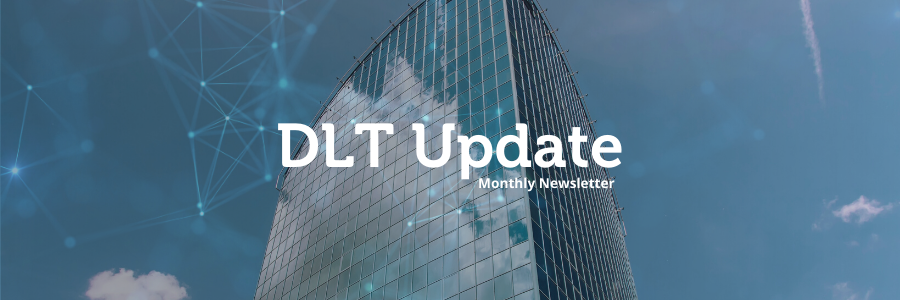DLT Update: September ’22

Latest industry news
The European Securities Markets Authority (ESMA) has issued its first report on the Distributed Ledger Technology Pilot Regime (DLT Pilot)
“In the report, ESMA provides guidance on technical elements and makes recommendations on compensatory measures on supervisory data to ensure a consistent application by DLT market infrastructures from the start of the regime.”
The published report is ESMA’s proposed way forward and includes the feedback received after the Call for Evidence presented in January and a workshop organised in March 2022. ESMA has concluded that there is no need to amend the RTS on transparency and data reporting requirements before the DLT Pilot starts applying in March 2023.
The DLT Pilot Regime is part of the Digital Finance Package introduced by the European Commission in 2020 to enable and support the potential of digital finance while mitigating associated potential risks.
This regulation aims at developing the trading and settlement for DLT financial instruments. The DLT Pilot “requires ESMA to assess whether the RTS developed under MiFIR relative to certain pre- and post-trade transparency and data reporting requirements need to be amended to be effectively applied also to securities issued, traded, and recorded on DLT”.
(ESMA)
ECB Reports on digital euro validation and privacy one year into investigative phase
After 1 year of the two-year investigative phase the key use and policy issues were clarified and more stakeholders participation will be needed. The ECB published a progress report on September 29th where it was stated commerce in physical stores and online is the biggest use case for a euro central bank digital currency (CBDC). A digital euro would “preserve the role of public money as the anchor of the payments system in the digital age. It would ensure the smooth coexistence, convertibility and complementarity of the various forms that money takes”.
Privacy for DeFi: Zero-Knowledge (ZK) Proofs make it possible
When it comes to blockchain privacy and scaling, zero-knowledge (ZK) proofs are a key technology. With the help of ZK technology, transactions can be verified while at the same time ensuring that no unnecessary details about the transaction other than the date and time are left on a blockchain (sensible information as credit, age, gender). Only the two transaction peers can access the detailed information on a specific transaction. This is a more secure method of verifying information and relieves data traffic on blockchains immensely, since all transactions no longer have to be stored on the main chain of a blockchain.
(BTC-Echo in German language)
Institutional appetite for Ethereum continues to grow amid bear market – BitMEX CEO
Now that the network is ESG compliant, according to the BitMEX CEO, institutional appetite for Ethereum will grow. At the Token2049 conference in Singapore on September 28th, the crypto executive told Cointelegraph that there has not been a “single slowdown of institutional push into crypto” during this bear market. He added that institutions and finance industry players typically use bear markets for innovation, therefore their continuing participation.
Pantera Capital CEO bullish on DeFi, Web3 and NFTs as Token2049 gets underway
Pantera Capital CEO Dan Morehead highlighted an optimistic outlook for the wider cryptocurrency space during a keynote presentation at Token2049 in Singapore. He described the potential growth and value of decentralized finance (DeFi), Web3 functionality, nonfungible tokens (NFTs) and metaverse applications while stating that new projects and use cases could promise even greater returns on investment.
Vietnam’s crypto adoption: Factors driving growth in Southeast Asia
Vietnam has the highest crypto adoption rate in the world.
1) “Unlike in the United States and other major jurisdictions where cryptocurrency holdings are taxed, there are no crypto taxes in Vietnam”. The Vietnamese government does not even recognize cryptocurrencies as legal tender and financial institutions in the country are barred from handling them. However, Vietnamese citizens are allowed to possess and trade crypto.
2) Vietnam has a huge unbanked population: Many Vietnamese have limited access to standard financial services due to their geographical location. According to a 2021 study carried out by Statista, the country ranks second among the top 10 unbanked nations. The report analyzes that about 69% of the citizens lack access to typical banking services. In particular, Vietnam is ranked second among nations with the highest DeFi usage in the world, according to the 2021 Chainalysis Global DeFi Adoption Index report.
3) Remittances: Vietnamese living abroad regularly send money to their families in Vietnam and the transaction fees are often exorbitant. The surcharges usually include administrative fees and exchange rates. According to World Bank statistics, remittance costs to Vietnam average about 7% as of 2020. High fees, in addition to the unbanked population’s lack of access to money transfer services, have made cryptocurrency transfers an appealing option for Vietnamese living abroad to help support their families back home.
4) Cryptocurrencies as a hedge against inflation: According to Statista, Bitcoin (BTC), which is widely used by investors as a hedge against inflation, is currently the most popular cryptocurrency in the country. Crypto adoption in Vietnam is set to persist as more Vietnamese discover the convenience and possibilities of digital assets.
5) Crypto Regulation in Vietnam is slow but in progress: The State Bank of Vietnam has until 2023 to study the pros and cons of cryptocurrencies and come up with policy recommendations.
We deliver. Digital. Excellence.
Stay up to date with the latest industry news, insights articles, tokenization success stories and use cases by subscribing to our newsletter!
